Does Splenda Break a Fast? Sucralose While Fasting

How Does Intermittent Fasting Work?
Understand the science behind intermittent fasting and its health benefits
Learn how fasting impacts metabolism, insulin sensitivity, and hormonal balance
Discover the four stages of intermittent fasting
Get practical tips for integrating fasting into your daily routine

How Does Intermittent Fasting Work?
Understand the science behind intermittent fasting and its health benefits
Learn how fasting impacts metabolism, insulin sensitivity, and hormonal balance
Discover the four stages of intermittent fasting
Get practical tips for integrating fasting into your daily routine

How Does Intermittent Fasting Work?
Understand the science behind intermittent fasting and its health benefits
Learn how fasting impacts metabolism, insulin sensitivity, and hormonal balance
Discover the four stages of intermittent fasting
Get practical tips for integrating fasting into your daily routine

How Does Intermittent Fasting Work?
Understand the science behind intermittent fasting and its health benefits
Learn how fasting impacts metabolism, insulin sensitivity, and hormonal balance
Discover the four stages of intermittent fasting
Get practical tips for integrating fasting into your daily routine

How Does Intermittent Fasting Work?
Understand the science behind intermittent fasting and its health benefits
Learn how fasting impacts metabolism, insulin sensitivity, and hormonal balance
Discover the four stages of intermittent fasting
Get practical tips for integrating fasting into your daily routine

How Does Intermittent Fasting Work?
Understand the science behind intermittent fasting and its health benefits
Learn how fasting impacts metabolism, insulin sensitivity, and hormonal balance
Discover the four stages of intermittent fasting
Get practical tips for integrating fasting into your daily routine

How Does Intermittent Fasting Work?
Understand the science behind intermittent fasting and its health benefits
Learn how fasting impacts metabolism, insulin sensitivity, and hormonal balance
Discover the four stages of intermittent fasting
Get practical tips for integrating fasting into your daily routine

How Does Intermittent Fasting Work?
Understand the science behind intermittent fasting and its health benefits
Learn how fasting impacts metabolism, insulin sensitivity, and hormonal balance
Discover the four stages of intermittent fasting
Get practical tips for integrating fasting into your daily routine

How Does Intermittent Fasting Work?
Understand the science behind intermittent fasting and its health benefits
Learn how fasting impacts metabolism, insulin sensitivity, and hormonal balance
Discover the four stages of intermittent fasting
Get practical tips for integrating fasting into your daily routine

How Does Intermittent Fasting Work?
Understand the science behind intermittent fasting and its health benefits
Learn how fasting impacts metabolism, insulin sensitivity, and hormonal balance
Discover the four stages of intermittent fasting
Get practical tips for integrating fasting into your daily routine

How Does Intermittent Fasting Work?
Understand the science behind intermittent fasting and its health benefits
Learn how fasting impacts metabolism, insulin sensitivity, and hormonal balance
Discover the four stages of intermittent fasting
Get practical tips for integrating fasting into your daily routine

How Does Intermittent Fasting Work?
Understand the science behind intermittent fasting and its health benefits
Learn how fasting impacts metabolism, insulin sensitivity, and hormonal balance
Discover the four stages of intermittent fasting
Get practical tips for integrating fasting into your daily routine

How Does Intermittent Fasting Work?
Understand the science behind intermittent fasting and its health benefits
Learn how fasting impacts metabolism, insulin sensitivity, and hormonal balance
Discover the four stages of intermittent fasting
Get practical tips for integrating fasting into your daily routine

How Does Intermittent Fasting Work?
Understand the science behind intermittent fasting and its health benefits
Learn how fasting impacts metabolism, insulin sensitivity, and hormonal balance
Discover the four stages of intermittent fasting
Get practical tips for integrating fasting into your daily routine

How Does Intermittent Fasting Work?
Understand the science behind intermittent fasting and its health benefits
Learn how fasting impacts metabolism, insulin sensitivity, and hormonal balance
Discover the four stages of intermittent fasting
Get practical tips for integrating fasting into your daily routine

How Does Intermittent Fasting Work?
Understand the science behind intermittent fasting and its health benefits
Learn how fasting impacts metabolism, insulin sensitivity, and hormonal balance
Discover the four stages of intermittent fasting
Get practical tips for integrating fasting into your daily routine
Though Splenda has zero calories, some evidence suggests it may increase blood sugar levels and trigger an insulin response that inhibits fat burning and will break a fast.
Not only is Splenda unsuitable while fasting, but it’s also linked to many potential health effects, and it's best to avoid this artificial sweetener as much as possible.
Learn why regular Splenda consumption may increase the risk of metabolic diseases and discover which sugar substitutes are safe while fasting.
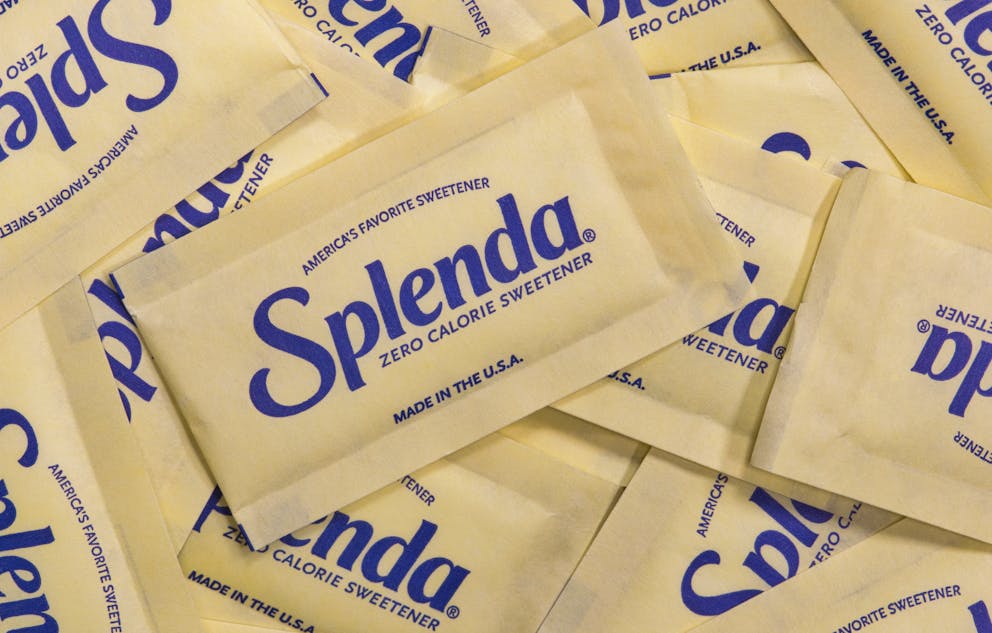
What is Splenda?
Splenda is a popular calorie-free sweetener, often used by people trying to manage their weight or seeking to reduce sugar intake.
Splenda is the brand name of sucralose, an artificial sweetener made by replacing the hydrogen-carbon bonds in regular sugar with chlorine atoms, creating a much sweeter and calorie-free sugar substitute.
Splenda can be found in a wide range of sugar-free products such as tabletop sweeteners, diet soda, lower-calorie foods, and baked goods.
In addition to sucralose, Splenda also contains maltodextrin and dextrose, which is somewhat surprising given that these sweetening agents have been found to raise blood sugar and insulin levels more than regular table sugar. This explains why it's possible to have high blood sugar levels despite no dietary sugar intake.
Watch the video below to learn why Splenda isn’t a keto-friendly sweetener.
Can sucralose break your fast?
Despite being calorie-free, sucralose has been found to cause insulin spikes, inhibit fat burning, and trigger metabolic pathways that break a fast in some individuals.
Research published in the American Journal of Clinical Nutrition suggests that consuming sucralose activates intestinal receptors called sweet taste receptors type 1 members 2 and 3 (T1R2 and T1R3), which directly stimulate insulin release from the pancreas.
And, what’s more, there is evidence that regular sucralose intake increases the amounts of glucose transport proteins in the liver, which hikes blood sugar absorption and may contribute to a constant state of elevated blood glucose and insulin levels.
These combined effects of sucralose can significantly counteract the metabolic benefits of intermittent fasting and may increase the risk of metabolic imbalances—including insulin resistance—in the long run.
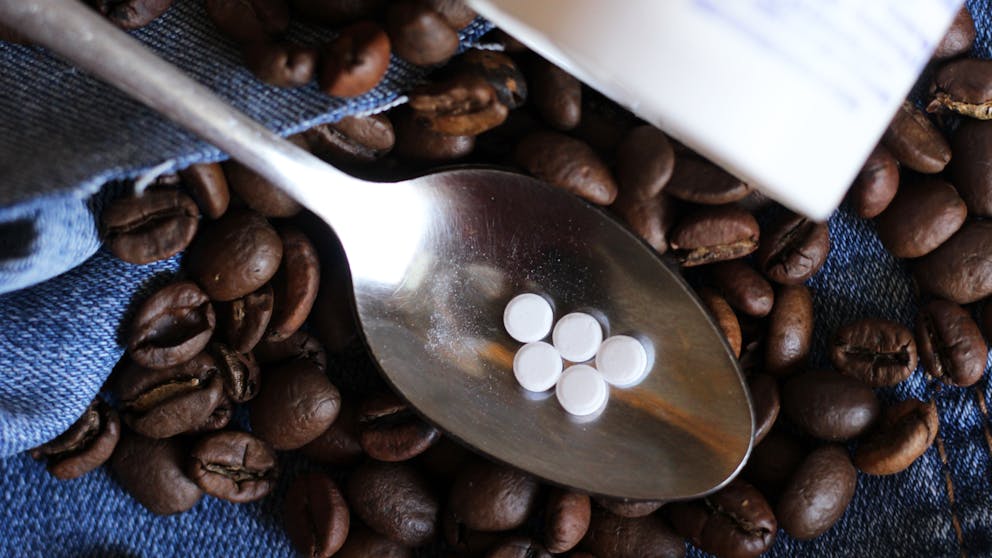
Four reasons to avoid Splenda
While the Food and Drug Administration (FDA) declared sucralose a safe food additive, there is increasing evidence that artificial sweeteners are linked to adverse health effects.
A large review study published in the Canadian Medical Association Journal found that using common artificial sweeteners, including sucralose, increases the risk of several metabolic conditions.
The study surmises, “Consumption of nonnutritive sweeteners was associated with increases in weight and waist circumference, and higher incidence of obesity, hypertension, metabolic syndrome, type 2 diabetes, and cardiovascular events.”
Here are four reasons why it's best to avoid Splenda!
1. Adverse effects on metabolic health
Because sucralose is 600 times sweeter than sugar, Splenda contains less than two percent of this synthetic sweetener.
The other 98 percent are maltodextrin and dextrose—types of carbohydrates high on the glycemic index, meaning they raise blood glucose levels as quickly.
Maltodextrin is among the worst ingredients. It mimics sugar and can have the same detrimental metabolic health effects as regular table sugar.
Consuming dextrose and maltodextrin has been found to contribute to decreased insulin sensitivity, the leading cause of diabetes, and may increase the risk of metabolic syndrome—a cluster of metabolic imbalances linked to heart disease, poor liver health, obesity, and cancer.
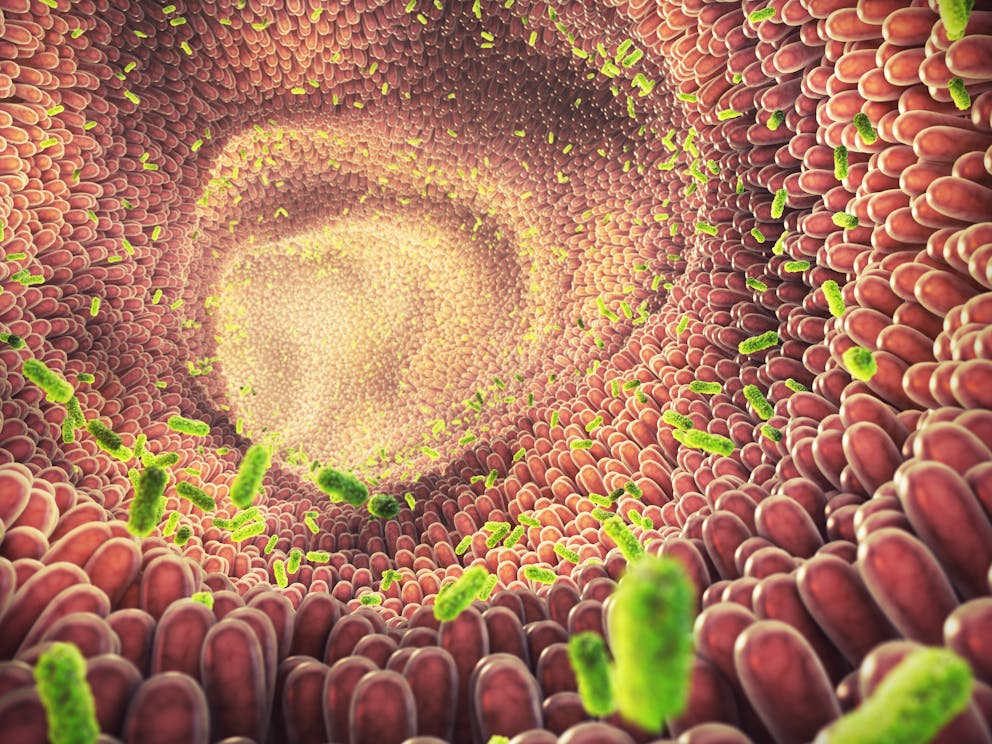
2. Disrupts intestinal microflora
“Evidence suggests that sucralose can disrupt the intestinal microflora,” explains Dr. Berg. “This increases the risk of dysbiosis, a condition characterized by decreased levels of beneficial bacteria and increased overgrowth of potentially harmful microbes.”
A balanced gut microbiome is essential for a healthy body.
Dysbiosis can significantly impair immune defenses and gut health and has been found to increase the risk of inflammatory bowel disease, Crohn’s disease, colon cancer, and other GI tract issues.
3. Linked to weight gain
Many individuals use non-calorie sweeteners like Splenda to lose weight. However, this may be counterproductive.
Splenda’s ingredients may activate the same metabolic pathways as sugar, which promotes fat storage and inhibits fat burning, potentially contributing to weight gain.
If your goal is losing weight, avoid Splenda—it won't promote fat loss.
4. May increase the risk of cancer
Although more research is needed to confirm the link between sucralose and cancer, research published in the International Journal of Occupational and Environmental Health found an increased risk of leukemia in response to large sucralose doses.
While this study has been conducted in rodents, it’s reasonable to question if long-term sucralose intake may have similar consequences in humans.
And, what’s more, Splenda undergoes chemical degradation when exposed to heat and may pose a health risk when used in baking or cooking.
Heating sucralose in combination with oils or fats has been found to generate chloropropanols, a potentially toxic class of compounds linked to fertility issues, impaired kidney function, and increased risk of cancer.
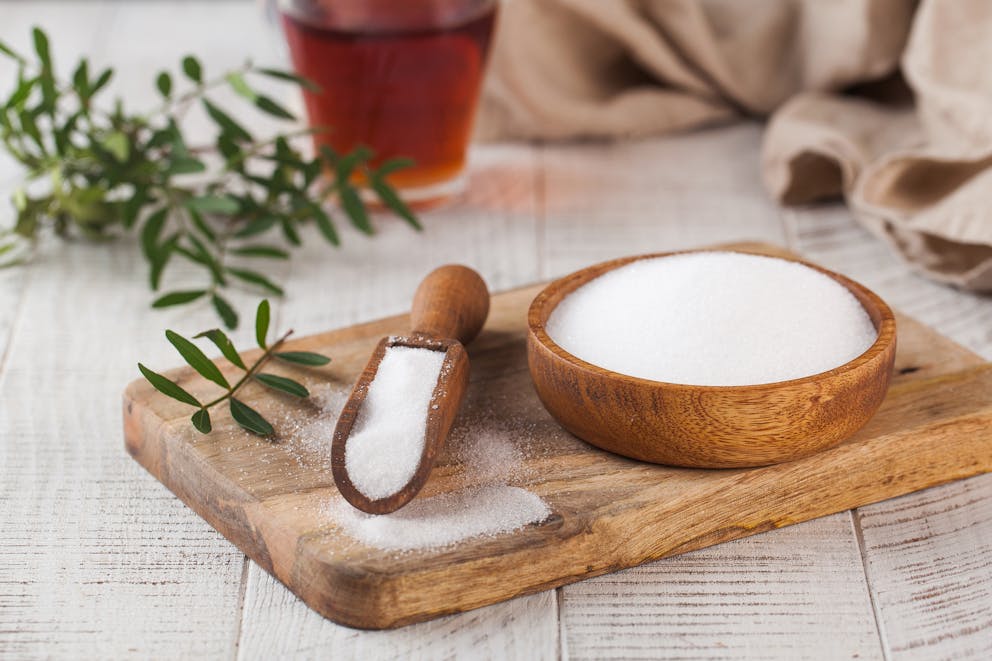
Alternatives to sucralose while fasting
It can be challenging to maintain or prolong your fasting periods if you have a sweet tooth—a single sugary treat will break a fast.
Fortunately, there are several sugar alcohols, natural sweeteners, and spices you can use during fasting that won’t break a fast. Take a look!
Erythritol
Erythritol is a type of sugar alcohol with a chemical structure similar to pure sugar. Erythritol isn’t digested and absorbed and has no impact on blood sugar and insulin levels, making it an excellent sugar substitute that won't break your fast.
Stevia and monk fruit
Both stevia and monk fruit are types of natural sweeteners that are 200 times sweeter than regular sugar but contain no carbs or calories.
They’re both fasting-friendly sweeteners that won’t spike blood sugar and keep insulin levels low.
Natural spices and extracts
If you enjoy herbal teas or bulletproof coffee while fasting, consider infusing your beverages with spices and extracts that add some natural hints of sweetness without adding calories or carbs.
Pure vanilla extract, cinnamon, nutmeg, and cardamom are excellent low-carb flavor enhancers.
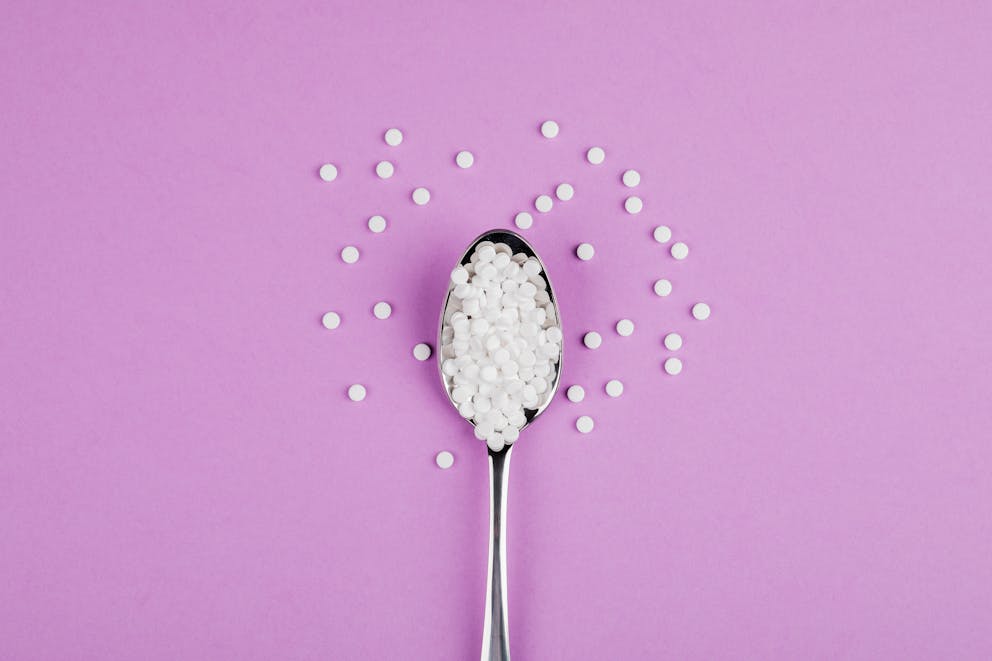
Key takeaways
Despite being calorie-free, Splenda isn’t keto-friendly and may break your fast.
Splenda contains sucralose, a sugar substitute that may interfere with your fasting state by triggering insulin release, which inhibits fat burning and pushes you out of ketosis.
Sucralose also has been linked to potential adverse health effects, and it’s best to avoid Splenda. Instead, choose keto-friendly sugar substitutes that won’t break your fast, such as erythritol, monk fruit, or stevia.
FAQ
1. Does Splenda stop intermittent fasting?
Yes, Splenda breaks a fast. Small quantities of Splenda could potentially stop your intermittent fasting period. Splenda contains sucralose, which has been found to break a fast in some people by triggering insulin release and activating metabolic pathways that may inhibit fat burning. Avoid diet sodas and other products that contain Splenda while fasting.
2. Will Stevia or Splenda break a fast?
There is evidence that Splenda breaks your fast. Splenda products often contain dextrose and maltodextrin, which are high glycemic index carbs that can quickly raise blood sugar and spike insulin levels.
Stevia, on the other hand, is one of the best keto-friendly zero calorie sweeteners. It doesn’t impact blood or insulin levels and won’t break a fast. It’s also derived from the stevia plant, making it a more natural option for a healthy lifestyle.
3. Does Splenda kick you out of ketosis?
Although Splenda contains no calories and may not cause increased blood glucose levels, it has been found to trigger the release of insulin in some individuals, which can push you out of ketosis.
In addition, Splenda typically contains bulking agents such as dextrose and maltodextrin, which have been found to mimic the metabolic effects of sugar and can quickly interfere with ketosis.
4. What is the best sweetener for fasting?
Erythritol, stevia, and monk fruit are the best go-to sweeteners for keto and fasting. These sugar substitutes won’t impact your blood sugar or insulin levels and are perfect for your intermittent fasting regimen. While fasting, it’s important to choose a natural sweetener with very few calories.
5. Is Splenda an artificial sweetener?
Yes, Splenda is classified as an artificial sweetener. Splenda contains sucralose, which is a synthetic compound produced by chemically altering sugar molecules, resulting in a sugar substitute that’s much sweeter than sugar but contains no calories.
6. Can Splenda spike your insulin?
Yes, there is evidence that Splenda can cause insulin spikes in some individuals. It’s best to avoid Splenda as much as possible if you are fasting, doing keto, or have any metabolic imbalances such as insulin resistance, metabolic syndrome, or diabetes.
7. What is the best alternative to Splenda while fasting?
Erythritol is a great alternative to Splenda while fasting. This sugar alcohol has a glycemic index of zero, which indicates that it doesn’t raise blood sugar and won’t affect insulin, making it a keto-friendly sugar substitute while fasting. Other sweeteners that are safe during your fasting window and will keep your insulin response low include stevia and monk fruit. These common sweeteners will not increase your caloric intake.
Previous blog
Puffy Nipples: The Top Causes and Best Natural RemediesTags

Popular
08/21/2024
43.6K views
05/22/2024
39.1K views
11/18/2024
228.1K views
03/18/2024
11/21/2022




